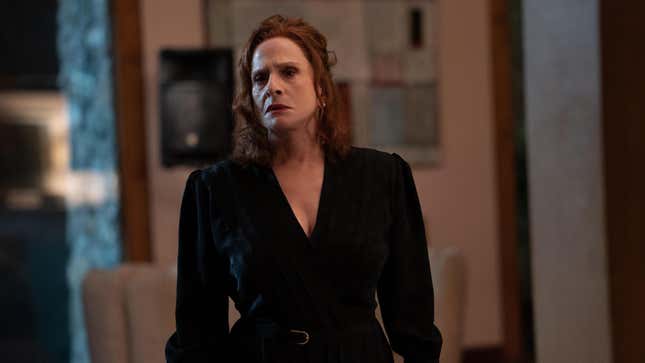Patti LuPone on Playing a Manipulative Mom to a ‘Pathetic’ Son in ‘Beau Is Afraid’
For "mad genius" Ari Aster's new film, the Broadway legend brought layers of emotion to her role as a mother "desperately disappointed in her kid."
EntertainmentMovies

Ari Aster’s newest movie Beau Is Afraid is disorienting, to put it mildly. The titular protagonist, played by Joaquin Phoenix as if he just got done screaming his head off or is about to, lives in hell. His city is awash in crime and zombie-like street dwellers, his keys and luggage are stolen from his apartment doorway in the blink of an eye, and he keeps getting notes from a neighbor asking him to turn his music down when no music is playing. We know he’s medicated and on the verge, and very early on it’s clear that his perception may be unique to him—and by extension, viewers of the movie. “Point of view” is too tepid a phrase to describe how this movie shares life through his eyes—it’s more like an all-encompassing umwelt that is both emotionally oppressive and narratively liberating. Beau’s paranoia and disturbance translate reality as fantastical as he makes the journey home to his mother, played by Patti LuPone and reported dead mid-movie. Along the way, he finds himself adopted by a couple who is (big shock!) not as benevolent as they initially seem and is plunged into an extended animated sequence that envisions an alternate life path for him.
Beau Is Afraid is the kind of movie that people (writers for NPR, Vulture, and RogerEbert.com) describe as a “fever dream.” And so does LuPone, or at least she did when I met her last week at New York’s Cherry Lane Theatre to discuss her role in the film. To be precise, “a mad genius’ fever dream [about] a man that is pathologically indecisive,” is how she put it.
For her part as the controlling Mona—who, spoiler alert, fakes her own death seemingly in order to ensure Beau’s return home—LuPone said it was her understanding that what happened in the script was “all real.” But it took her a few reads to really get it: “There’s so much that I missed when I read the script two or three times, and Ari had to explain to me how she does manipulate this whole thing, how she does control him in protection of him, and how he constantly lets her down.”
When Aster, the director of previous A24 hits Hereditary and Midsommar whose name is practically synonymous with “elevated horror,” reached out, LuPone said she hadn’t seen his movies, but her 32-year-old son Joshua Luke Johnston told her, “Mom, that’s the guy.”“I thought, ‘Why me?’” recalled LuPone on getting the call. She remembered wondering if Aster was a “theater queen.” The writer-director had seen her in David Mamet’s play The Anarchist, as Aster is, according to LuPone, friends with Mamet’s daughter Clara. LuPone has worked with Mamet regularly since the ‘70s, and so when she landed the role in Beau Is Afraid (which she says was originally intended for Fiona Shaw), she wrote Mamet to thank him.
LuPone called Mona “the best movie part I have ever been given.” What drew her to the role was “the language, the emotional arc of it, the ability to play several different colors in the part. And this is all a woman. You know what I mean?”
-

-

-

-

-

-

-

-

-

-

-

-

-

-

-

-

-

-

-

-

-

-

-

-

-

-

-

-

-

-

-

-

-

-

-

-

-

-

-

-








































